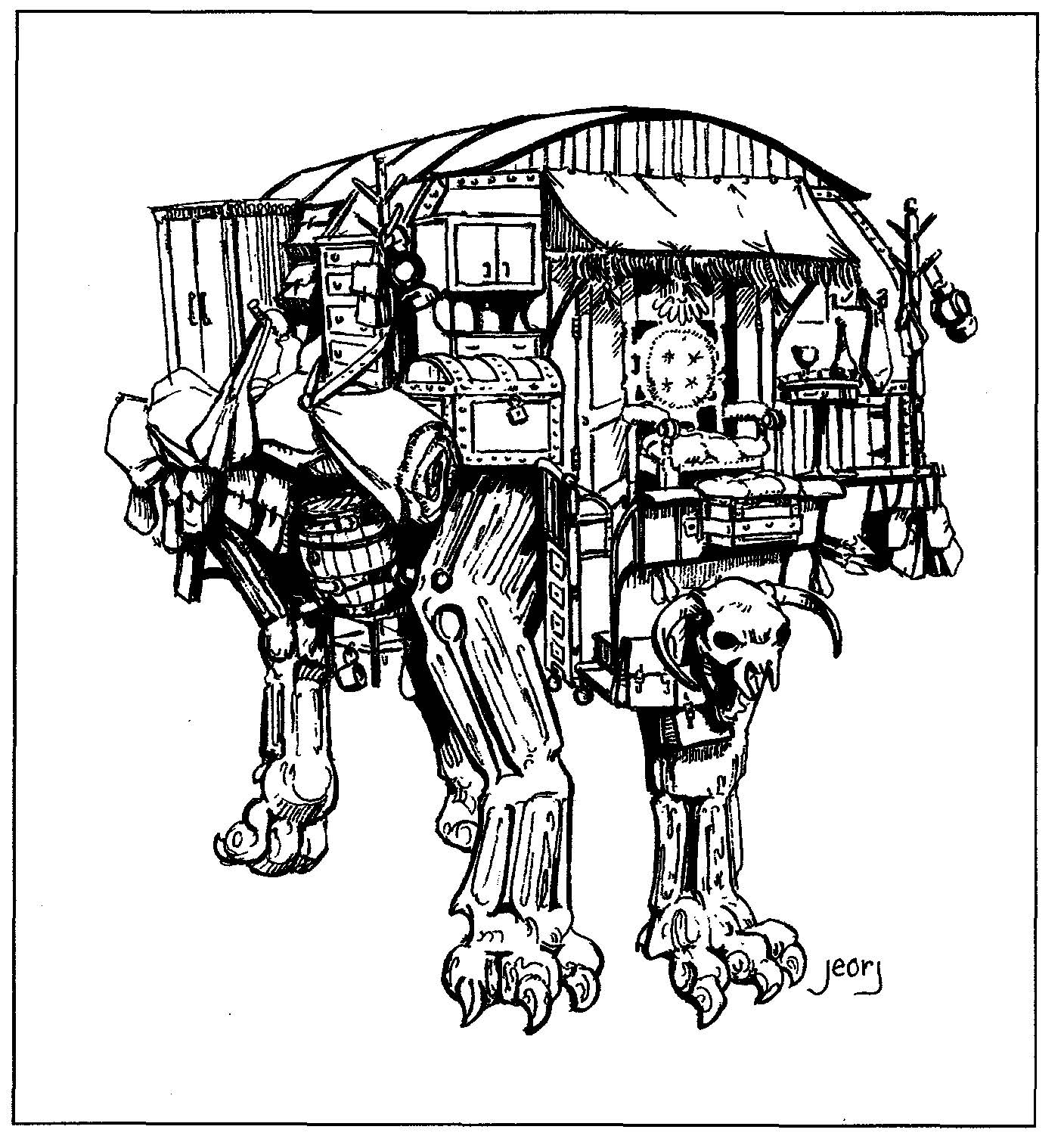
| Climate/Terrain: | Any Land |
|---|---|
| Frequency: | Very Rare |
| Organization: | Solitary |
| Activity Cycle: | Any |
| Diet: | Non- |
| Intelligence: | Semi- (2-4) |
| Treasure: | Special |
| Alignment: | Neutral |
| No. Appearing: | 1 |
| Armor Class: | 1 |
| Movement: | 9 |
| Hit Dice: | 12 (72 hp) |
| THAC0: | 9 |
| No. of Attacks: | 1 |
| Damage/Attack: | 1-10 |
| Special Attacks: | Crush, bite of sharpness, bellow |
| Special Defenses: | Wizard Locks, +1 weapon to hit, Immune to mind influencing spells |
| Magic Resistance: | 15% |
| Size: | M (7' at shoulder, 11' long) |
| Morale: | steady (11-12) |
| XP Value: | 7,000 |
Caravan servants are created by a wizard of at least 15th level, who forms the automaton from a variety of sculpted stone, furniture, barding, leather tacking, saddles, pouches, knobs, spikes, hooks, straps, sacks, and saddlebags for the purpose of carrying and/or pulling large quantities of cargo (up to 1,200 lbs.). All caravan servants have between four and eight sturdy clawed legs and a head. Beyond these requirements, the wizard's artistic whims are as important as functional considerations, making the caravan servant the most varied in appearance of all the talisman servants. For example, a caravan servant that belonged to a wizard who favored dragons might have a dragon's skull for a head, a large trunk as its body, and a length of chain for a tail. The talisman associated with this type of servant usually takes the form of a whistle, a walking stick, riding crop, or a mahout's goad.
Combat: Designed as a beast of burden, the caravan servant is not a dependable fighting machine. However, in an age of numerous thieves and brigands, the caravan servant is capable of protecting its master and its cargo. On the command of its master, the caravan servant can wizard lock every drawer, saddlebag, or trunk that makes up its body (and only these containers). Any tampering on the servants compartments without the master's approval triggers the servants defenses.
A caravan servant uses its tremendous Strength (24) and weight to pin, smash, or crush its opponent for 1d10 hp damage per strike. Alternatively, it bites with its powerful jaws with the same effectiveness as a sword of sharpness, also for 1d10 hp damage. A natural attack roll of 19 or 20 results in the loss of an opponents limb.
A caravan servant also provides a fearless and solid barrier against hailstorms of arrows and can open doors, gates and fences which might otherwise be closed (a 7 in 8 chance of success). When a wizard merchant came to a city, he needed a way to alert the guard without straining his voice, thus he gave his servant a voice—a loud one. A caravan servant can deliver a thunderous bellow three times a day. This roar can panic any beast or person not trained for battle with the effect of a fear spell; a successful save vs. spell negates the effect.
The caravan servant may be harmed only by weapons of +1 or greater enchantment. It is unaffected by magic that affects the mind (e.g., feeblemind, charm, and illusion spells). Many wizards named their caravan servants (e.g., Chamfron, Lilac, or Bender). This was not an indication of soft emotions but rather a means of bonding and recognition between master and servant. If a stranger stole a talisman and took command without a proper introduction, the results often proved fatal. A caravan servant might ignore the interloper, balk at his commands, or even attack. There is one story of a caravan servant who chased a foolish scoundrel through a town before crushing the man against the prison gates.
There is a 50% chance that a caravan servant will selfactivate if someone says its name or it is in mortal peril. Once activated, it yawns, stamps its feet, and begins to look for its master, smashing through doors and walls in its search.
Habitat/Society: Unlike other automatons, caravan servants have a reputation for being amiable, loyal, tireless, affectionate, and steady. As such, caravan servants were well known and welcomed in many towns. When Netheril was in its glory, caravan servants could be found in any market square or livery stable, or encountered in an overland merchant caravan in the company of their masters. In modern times, functioning servants are rare, found hidden away in desolate ruins or following an ancient path, bringing the bones of its master home.
Ecology: As created beings, caravan servants need not eat, drink, or rest; nor do they impact greatly on their environs. An intact caravan servant usually (85% of the time) has cargo when encountered. A cargo may consist of anything from a portion of a dragon's hoard to a load of manure.
